Identity, Essence, and Toy Story
Part 5 of the series How to be yourself, with help from Disney/Pixar (Thinking about Identity and the Inner Voice)
Imagine that you are a dentist. Your patient comes in, sits down in your chair, and opens their mouth wide. You operate upon the patient. When you are done you hand them a mirror and ask if they are pleased. They look in the mirror and see that instead of filling their cavity you have shaved off their eyebrows. They are not pleased.
When it comes to a job, it is clear that what I am should have an impact upon what I do. Dentists should be fixing people’s teeth. Plumbers should be unclogging people’s drains. Economists should be … doing whatever it is economists do. (Economizing?) It is clear that my professional identity should dictate my professional actions.
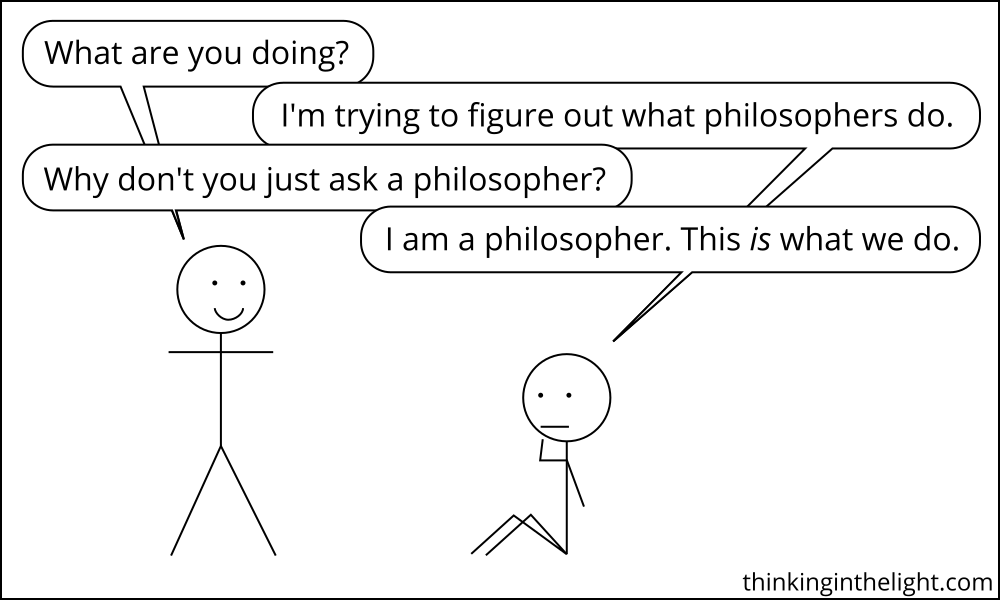
But what about when we step out of the limited sphere of professional behavior? What should I look to when thinking about how I should live my life?
In answering this question, several posts in this series have suggested looking to an external morality, as opposed to listening to an inner voice. Pinocchio is guided by his conscience rather than his desires. In Frozen it seems that Elsa should have thought about others rather than run off on her own. And in Frozen 2 Anna does the next right thing rather than focusing on herself.
In each of these cases, it is all well and good to say that I should be moral rather than selfish, but what would determine this morality that lies outside of my wishes and my feelings? Is it at all similar to the professional behavior above, with the morality coming out of my identity? On the other hand, if my identity is determined by my inner voice, wouldn’t this morality be violating it?
In order to think about these issues more, I am going to turn from Disney movies proper, to Disney’s subsidiary, Pixar. Their first movie, Toy Story, already displays the high quality that Pixar has generally maintained. Computer animation has advanced significantly since Toy Story—some of the faces are a bit on the creepy side—but the storytelling has withstood the test of time. Woody’s jealousy, Buzz’s narcissism, Sid’s malevolence (and the plan to combat it)—these all combine to make a funny and heartwarming story. (Which I will be discussing, so spoiler alert.)
Woody the cowboy is a toy and happy about it. He is particularly happy about the fact that he is his owner’s favorite toy, so he gets played with all the time. This happiness is shattered, however, when his owner, Andy, gets a new toy: Buzz Lightyear the space ranger. When Buzz takes Woody’s place, Woody tries to take Buzz out of the equation.
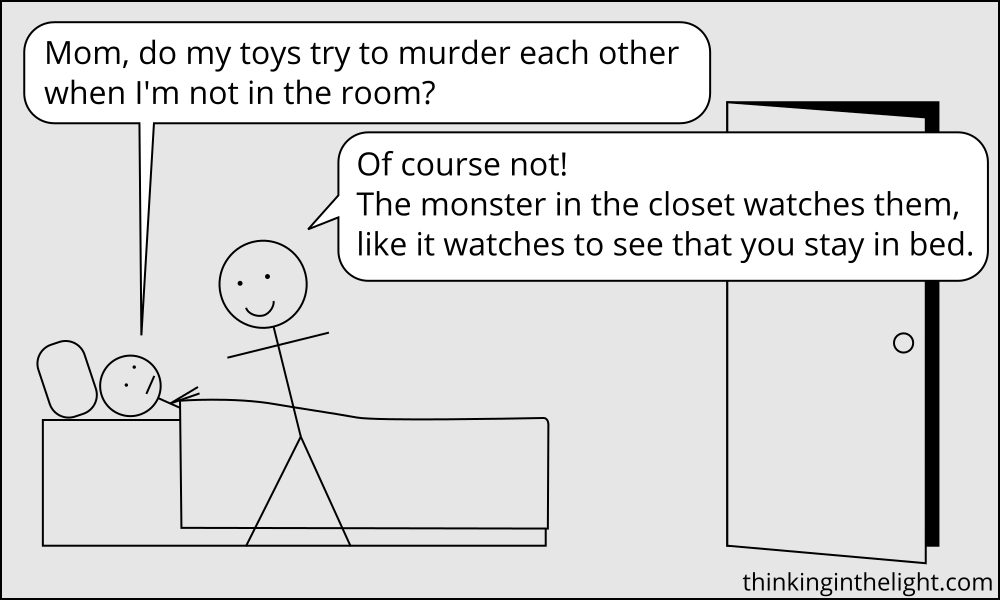
Buzz, on the other hand, is a toy but doesn’t know it. He thinks he is actually a space ranger. At one point when Buzz is explaining to Woody that he must rendezvous with Star Command, Woody tries to hammer home the absurdity of this to Buzz (a lesson he does not learn).
Woody: “You are a toy! You aren’t the real Buzz Lightyear. You’re an action figure. You are a child’s plaything!”
Buzz: “You are a sad, strange, little man, and you have my pity.”
We could say that Buzz is one thing, but his inner voice says he is something else. This disconnect drives his story, and the comedy of his situation comes from the way he acts on the voice while acting in the world of a toy.
This comedy turns to tragedy when Buzz finally realizes he is in fact a toy. He stumbles across a TV commercial for the Buzz Lightyear action figure and recognizes himself in the ad. The commercial even goes so far as to point out specifically that he is not a flying toy—an ability he had earlier claimed and prided himself upon. With this recognition of his toyhood, Buzz goes through a series of three reactions.
First he takes up an attitude of defiance. He rejects once again the idea that he is a toy, and he tries to fly through an open window. The attempt fails. Buzz does not soar but instead falls to the bottom of the stairs, and the landing breaks off his arm. The idea that he is a space ranger not only proves false, but in leading him to jump off the bannister it ends up harming him.
Next Buzz turns to despair.
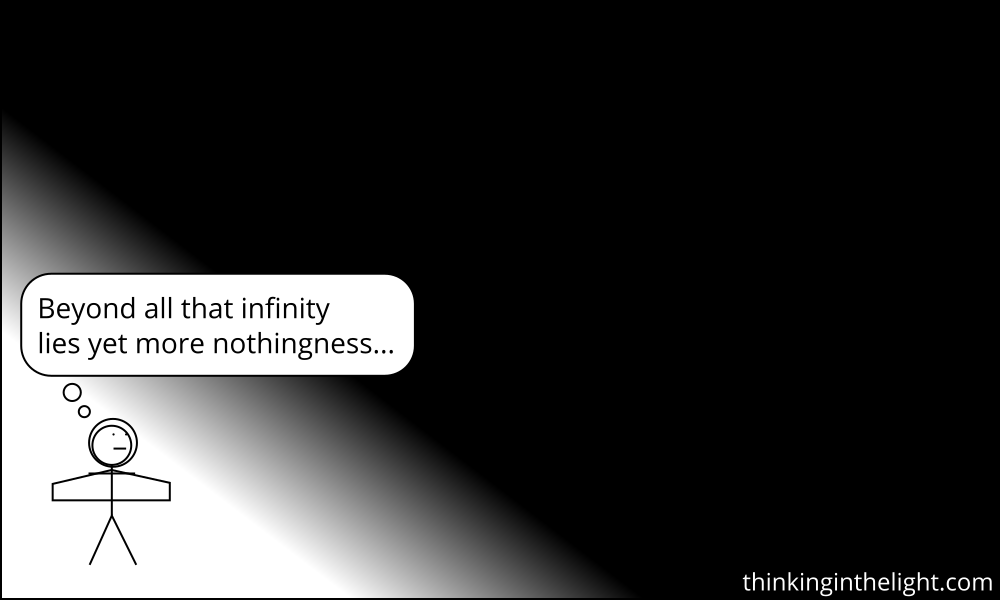
He just sits around and doesn’t care what happens to him, even when this means being strapped to an explosive device. He has now fully grasped what he is, and this knowledge leads him to feel worthless.
Woody, for the first time I am thinking clearly. You were right all along. I’m not a space ranger. I’m just a toy—a stupid, little, insignificant toy.
Woody responds to this despair by asking Buzz to look at his situation differently.
Whoa, hey, wait a minute. Being a toy is a lot better than being a space ranger. … Look, over in that house is a kid who thinks you are the greatest. And it’s not because you’re a space ranger, pal. It’s because you’re a toy. You are his toy.
This response leads Buzz to his final reaction: acceptance. As Buzz ponders what Woody said, he looks down at the sole of his foot, where Andy wrote his name. When he realizes that Woody is right, he tells Woody that they need to go, because “there’s a kid over in that house who needs us.” He has accepted that he is a toy and that this gives him a good role to serve in.
Actually, there is one further stage in Buzz’s journey, but it is merely implied in Toy Story. He is not meant merely to accept that he is a toy, a thing that can make Andy happy. Rather, he will find joy in being this. The movie illustrates this joy through Woody’s story. Early on in the movie, the toys are worried that if Andy gets new toys for his birthday he won’t play with them as much anymore, and Woody tells them not to worry.
It doesn’t matter how much we’re played with. What matters is that we’re here for Andy when he needs us. That’s what we’re made for, right?
But this speech comes out of Woody’s naiveté. He is currently Andy’s favorite toy and can’t truly picture not being played with. When Buzz comes and Woody loses his place, he becomes consumed with jealousy. Why? Because, as the early scenes of Andy and Woody illustrate, being played with gives Woody joy. In other words, it is good to be a toy with the potential to bring a kid happiness, but it is even better to be actively fulfilling that role and being used as a toy. Buzz presumably finds this out as well.
So what are the philosophical implications of Buzz’s story arc? Buzz’s identity is not determined by his inner voice—what he thinks and feels he is. If it were, then he would simply be a space ranger. Instead, his identity is determined by the objective fact that he is a toy. It is defined by what he is, by his essence.
The essence of a thing is that which defines it as the kind of thing it is. For example, the essence of a bird is to have feathers, wings, and so on. For most kinds of birds, their essence includes flying. (Penguins and ostriches choose to flout that convention.) But essence does not include the unique features of individuals, since it is about defining kinds. Thus, Big Bird’s essence includes having feathers but not being friends with Elmo and Snuffy. Buzz’s essence is that of a toy. He is a child’s plaything.
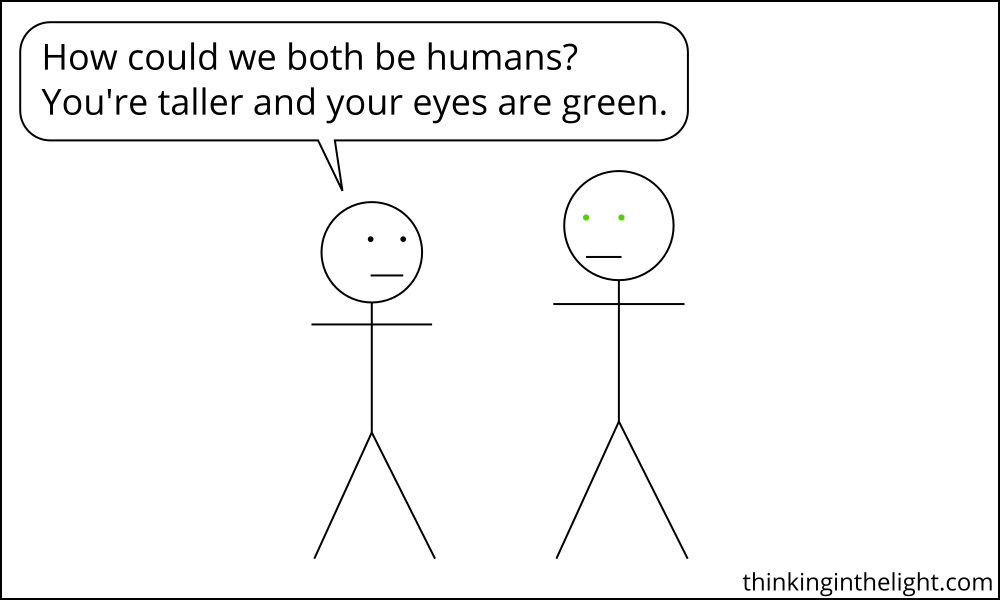
Further, this essence-derived identity has implications for Buzz’s behavior. If he is a toy and not a space ranger, then he ought to behave like a toy and not a space ranger. That is, the external rules that apply to him—the morality that comes not from his inner voice but which exists objectively somehow—these rules arise in part from his essence. This morality is not simply a set of commands for how he ought to behave towards others (such as being there for Andy). It also dictates what will benefit himself. When he tries to defy his identity he harms himself, and when he acts according to it he finds joy.
Let me give an analogy to make this same point about the link between essence and ethics. Suppose that you buy a waffle iron. As you are sitting there with your thick maple syrup and your rich, creamy butter, waiting to eat those hot, crispy waffles, you realize something about your new waffle iron. It doesn’t actually make waffles. When you plug it in it just lights up and plays the theme to Star Wars. At this revelation you are probably tempted to say that this new purchase is not a waffle iron. However, upon looking at its lid it says right there “Ultra Waffle Iron 3000,” so your next thought is probably that this is a bad waffle iron. And that is the point I wanted to make. What a thing is—its essence—determines to some extent what it ought to do. A good waffle iron makes waffles well. A bad one doesn’t.
Now, I suspect that you are not a waffle iron, nor even a sentient toy. You are a human being. What does everything discussed so far have to do with you?
According to Christianity, we are all like Buzz. God made us to be something specific, creating us to have a particular essence. He made us to be humans. And this identity means that we have the obligation to live out what we are. The scope of this obligation requires a lot of consideration, but it at least includes things like respecting the other humans around me as fellow creations, as well as honoring God as my creator. And this obligation is something we don’t like, because we prefer to prioritize ourselves and follow the inner voice.
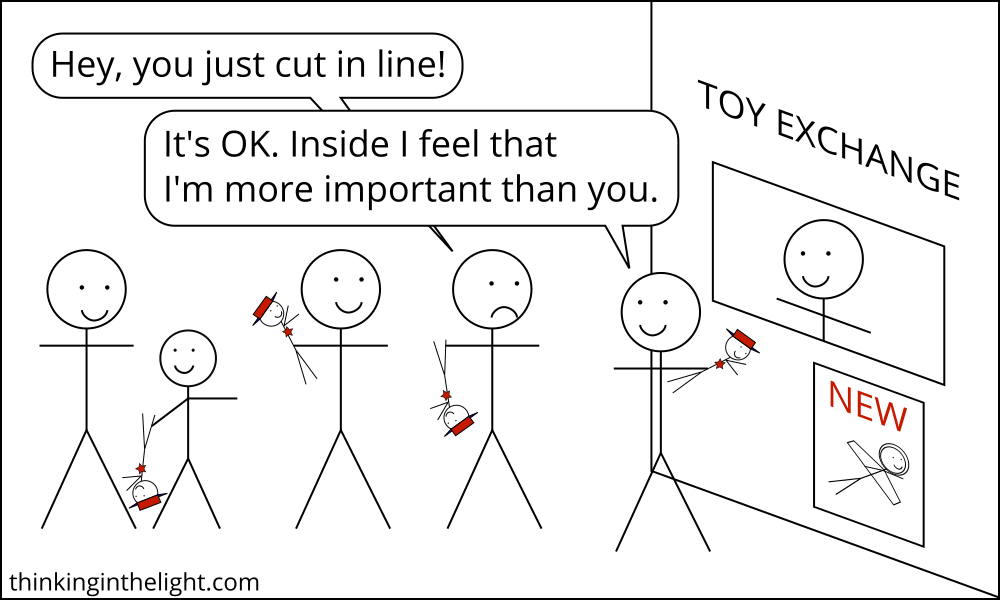
The Christian philosopher Augustine nicely sums up this idea that my actions should be dictated by what I am created to be, rather than by what I think I want.
When man lives according to truth, then, he does not live according to self but according to God. … But when he lives according to himself—that is, when he lives according to man and not according to God—he most assuredly lives according to a lie. … because man was created upright, to live according to his creator and not according to himself—that is, to do God’s will rather than his own. Not to live as he was created to live, then, is to live a lie.
Augustine, The City of God, Book XIV
Like Buzz, we want to live out what we think we are, but this is to live a falsehood, since we are really something else. We are a creation, not the creator. We are a human, not God. And also like Buzz, if we insist on following through with our self-conception, we will end up harming ourselves.
Man obviously wills to be happy, even when he is not living in a way that makes it possible for him to attain happiness. And what could be more false than such a will? It is no mere empty words, then, to say that every sin is a falsehood. For sin only takes place due to our willing either that things should go well for us or that they should not go badly for us. Thus the falsehood is this: we sin so that things may go well for us, and instead the result is that they get worse. What is the reason for this except that a man’s wellbeing can only come from God, not from himself? But he forsakes God by sinning, and it is precisely by living according to himself that he sins.
Augustine, The City of God, Book XIV
We want to have a good life, to be satisfied. So we try to arrange the world to fit what we think we need. Our inner voice tells us what to do and we obey. Surely, if we could just make the world conform to the visions in our heads, then we would be happy!
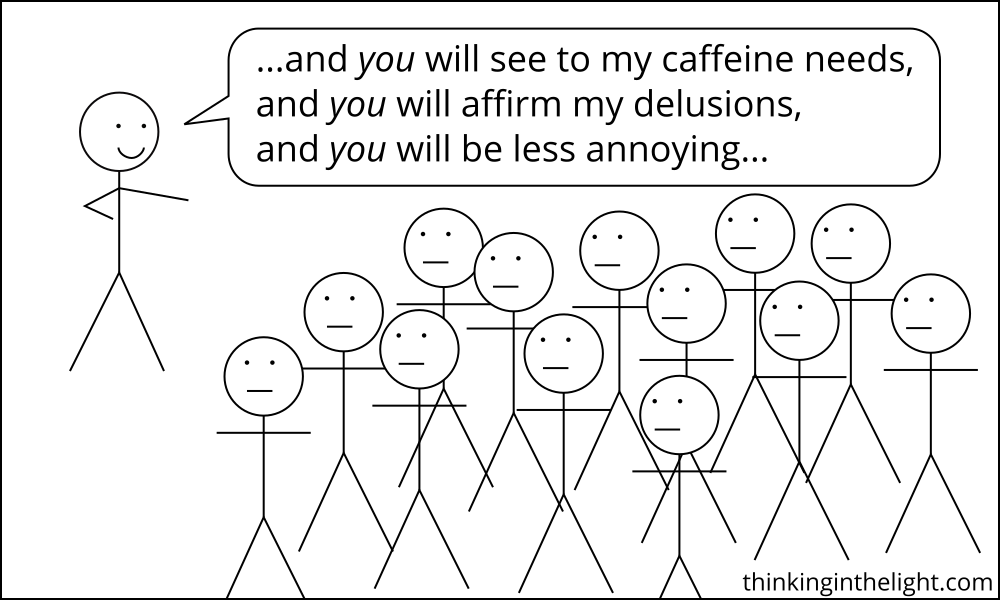
But this attempt at happiness is doomed to fail, because we overlook the fact that the good life, the satisfying life, is to be found in God. This is how God made us to find our satisfaction. We both do wrong and harm ourselves when we ignore the identity based in our essence and instead follow our inner voice.
The Christian view of the world sees us as God’s creation, and this explains why our identity is not rooted in our inner voice but in our essence. It also explains why we have moral obligations we should listen to for both objective reasons (God as the authority tells us to) and subjective ones (our lives will be better). But this Christian idea is often seen as problematic. To have my identity constrained by external factors, to have it not be reflective of how I perceive myself on the inside—these are felt to be constricting and inauthentic.
And this reaction makes sense if there is no God.
If God does not exist, then there is no cosmic authority to give me an essence, and consequently I have nothing that I am supposed to be. There is just me and how I feel about myself—just what my inner voice says. If something else is defining me, then it must be coming from other people—from society—since this is the only option available. This identity is either explicitly imposed in the form of rules or self-imposed by me trying to conform to what people expect. In either case this constraint is seen as something to fight against. “Morality” is just something external imposed on me by others, and I need to resist it, authentically expressing the identity I find through my own inner voice.
When answering questions about identity, then, it matters whether or not there is a God. Have we already been defined and given an identity, or is the job left up to us?
I should note that this isn’t necessarily a question of religion. Religions are often seen as the ultimate constrainers, shackling people to their narrow moralities. And if there is no God, or if a religion fails to take into account the real God that exists, then religion can simply be a tool society uses to impose itself on others.
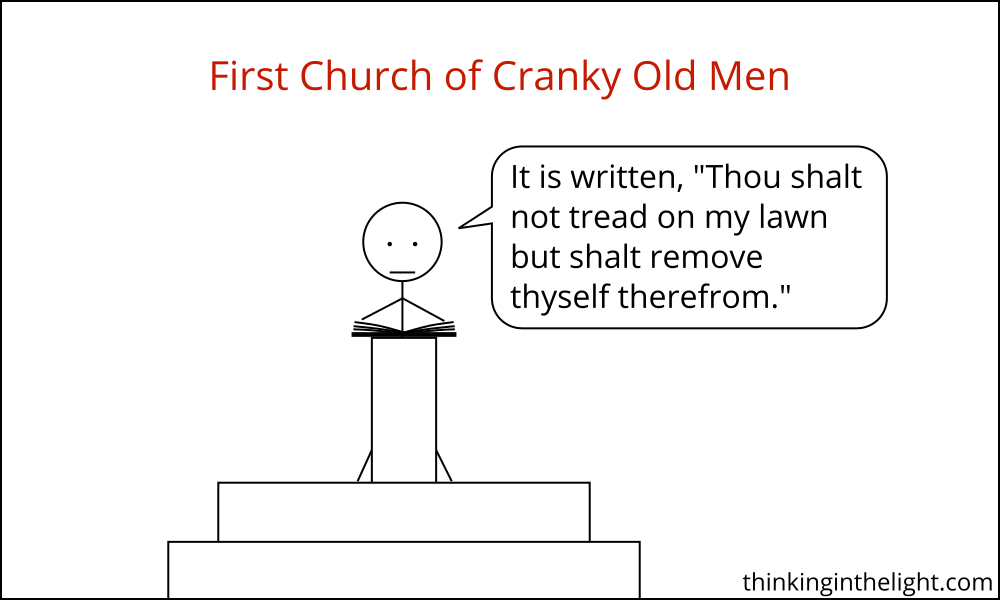
But if there is a real, existing God who created me to be human, then following his design is radically different from having a man-made religious system imposed on me by other humans. It is not conforming to someone else’s standard. It is being who I am.
And I do think it makes most sense to see God as defining me. It is why I am a Christian. Part of the evidence for God’s existence is this very role as essence-giving creator. If I have no essence—if it is truly up to me to define myself—then why not be a racist, thieving murderer? Few people would see this course of action as a good one, and as a society they could impose their view upon me and stop me. But if this is going to be more than a contest of wills, then there is going to have to be something that defines me apart from myself and apart from society. God’s existence helps to explain the existence of morality and justice.
Now, this post is not really about proving God’s existence. Instead, it is looking at the implications for my identity if he does exist. If God has created me and made me to be a human, then this essence defines me and impacts how I should act—just as Buzz’s toyness impacts the action he should pursue. My inner voice says neither who I am nor what I should do.
Before ending, I want to address one more concern that might arise from this comparison to Buzz.
Buzz is a toy, and this means that his duty is to be at Andy’s beck and call. He is carried around, crashed into things, and abandoned when it’s time to eat pizza. This raises the awkward question: If it is God who defines my essence, am I just God’s toy?
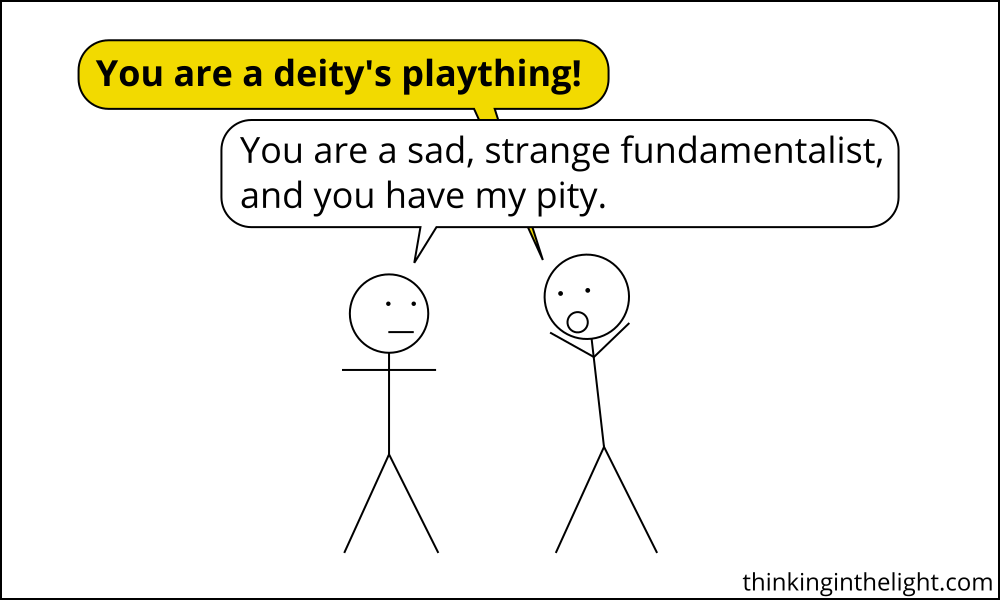
It is true that if God defines me I am not autonomous in the way I often imagine myself. But if I was to think of myself as “just God’s creature” I would make the same mistake as when Buzz lamented that he was “just a toy.” I lose sight of the joy that comes from being what I am.
Woody and Buzz take joy in being played with by Andy, a fickle human child. How much more, then, should I find joy in being the creation of a wise, loving God. As Augustine explained above, it is by centering my life on God that I will find the satisfaction I crave. That is how I was designed to find satisfaction. God is wiser than I am, so it makes sense that he would be better at knowing what will truly satisfy. And God loves me, so I can trust his plan.
This post has managed to go from bickering playthings to God’s love. It has also nearly closed out this series on identity and the inner voice. Next time will be the final post, and it will again raise the issue of essence, considering an implication of what I have said here for how we tell stories. In it, I will leave behind the toys and venture into the world of fine cuisine.
Share this post or sign up for future posts:
Bibliography:
- Toy Story. Pixar Animation Studios, 1995.
- Augustine. The City of God. Translated by William Babcock. The Works of Saint Augustine I/7 (The City of God: Books XI-XXII). New City Press. 2013. (The quotes from Book XIV above are from page 103 of this edition.)
